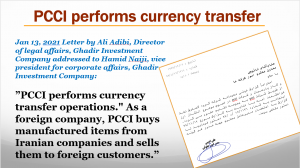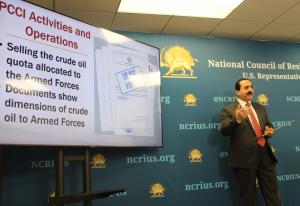The IRGC Papers: NCRI-US Exposes How Iran's Regime Evade Sanctions, Funds Terror through Oil and Petrochemicals Revenue
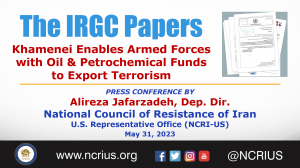
On May 31, 2023, the U.S. Representative Office of the National Council of Resistance of Iran (NCRI-US), held a press conference in Washington, DC, entitled 'The IRGC Papers' to expose the regime’s scheme to evade sanctions.
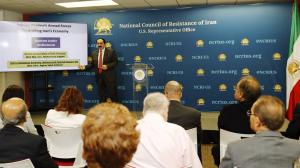
On May 31, 2023, Alireza Jafarzadeh, Deputy Director of the U.S. Representative Office of the National Council of Resistance of Iran (NCRI-US), held a press conference in Washington, DC, entitled ‘The IRGC Papers’ to expose the regime’s scheme to evade sanctions.

Classified documents and intelligence shared during a press conference on May 31, 2023, by the Washington office of the National Council of Resistance of Iran (NCRI-US), exposing the IRGC's elaborate clandestine scheme to evade sanctions.

Classified documents and intelligence shared during a press conference on May 31, 2023, by the Washington office of the National Council of Resistance of Iran (NCRI-US), exposing the IRGC's elaborate clandestine scheme to evade sanctions.
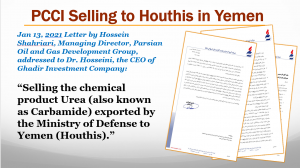
Classified documents and intelligence shared during a press conference on May 31, 2023, by the Washington office of the National Council of Resistance of Iran (NCRI-US), exposing the IRGC's elaborate clandestine scheme to evade sanctions.

Classified documents and intelligence shared during a press conference on May 31, 2023, by the Washington office of the National Council of Resistance of Iran (NCRI-US), exposing the IRGC's elaborate clandestine scheme to evade sanctions.
The classified documents were obtained by the vast network of Iran’s main opposition group, the Mujahedin-e Khalq (MEK), inside Iran.
WASHINGTON, DC, UNITED STATES, June 6, 2023/EINPresswire.com/ -- On May 31, 2023, the U.S. Representative Office of the National Council of Resistance of Iran (NCRI-US) held a press conference in Washington, D.C., entitled 'The IRGC Papers.' Mr. Alireza Jafarzadeh, Deputy Director of the NCRI-US, presented classified intelligence and analysis detailing an elaborate international scheme by the Islamic Revolutionary Guard Corps (IRGC) to evade sanctions and fund terrorism.
The classified documents were obtained from the vast network of Iran’s main opposition group, the Mujahedin-e Khalq (MEK), inside Iran. The findings revealed how the IRGC circumvents sanctions by diverting Iranian oil and petrochemical profits to finance its covert terror operations abroad.
Specifically, the conference detailed how a front organization, Petrochemical Commercial Company International (PCCI), funds Iran’s Armed Forces Social Security Organization (SATA) through its subsidiaries, Ghadir Investment Company and the Parsian Oil and Gas Group. All three of these organizations are under the control of the IRGC, which uses the country’s cash flows to project fundamentalism abroad via terrorism and other destabilizing activities.
Within this scheme, SATA, and indirectly Ghadir Investment Company and several other economic entities, are under the supervision of IRGC Brigadier General Majid Ibnalreza within the overarching “Headquarters for Resistance Economy, National, and External Cooperation.” Supreme Leader Ali Khamenei has overseen this Headquarters to cede Iran’s economic arteries to the IRGC, using the funds to continue its terrorist activities, nuclear development, and repression of protesters in Iran.
The ‘IRGC Papers,’ highlighted by Jafarzadeh at the press conference, contained nine documents. Each detailed how the PCCI, though subjected to secondary sanctions since 2011, has been effectively used as a front organization by Tehran to conduct sanctioned activities such as funding terrorism. Using the PCCI, the regime has avoided international scrutiny and accountability for its malign activities.
One of these nine documents was a January 13, 2021, letter from Hossein Shahriari, managing director of Parsian Oil and Gas Development Group Company, to Dr. Hosseini, the CEO of Ghadir Investment Company. The letter said that “PCCI company was entrusted with the sale of crude oil allocated to the General Staff of the Armed Forces,” that PCCI sold “five million barrels of extra heavy crude [Venezuelan] oil per month for one year,” and that it was assigned the “implementation of… the purchase and sale of export urea between SATA and the Yemen People’s Support Headquarters.”
As explained by Jafarzadeh, the papers also unveiled that the PCCI has supplied oil to Syria and has been performing ‘currency transfer operations’, in which the company buys Iranian manufactured goods and sells them to foreign markets.
The IRGC Papers include three other documents: a report from Saeed Alsadaat, the head of the Intelligence Protection of the Armed Forces Social Security Organization, a report from Kamran Pour Mohammadi, Deputy of Economic Affairs for the Social Security Organization, and a letter from Akbar Lotfi, Deputy for Finance, Investment and Companies. These documents show how the Parsian Oil and Gas Development Group has used oil and petrochemical revenues to help suppress Iranian protests. The latter of the papers claims that “4 billion rials from Pardis Petrochemical Company was wired into the account of the Armed Forces Social Security Organization” to suppress protesters in the Asaluyeh Economic Region.
When a reporter asked if the United States Treasury Department has responded to any of this information, Jafarzadeh stated that NCRI-US has already reported its findings to the Office of Foreign Assets Control (OFAC) and other relevant U.S. Government agencies.
Speaking further in response to questions regarding how the United States could improve its sanctions policy, Mr. Jafarzadeh stressed the problem as both technical and political. On a technical level, the US will have to apply additional sanctions and enforce the sanctions already in place, thus creating a ‘network of accountability’ to counter the Iranian regime. Nevertheless, positive change will have to occur on a policy level, as the current strategy of negotiation and appeasement by the United States and European nations has only emboldened the regime to continue its malign activities.
The July 31st news conference provided further evidence of the lack of transparency of the Iranian regime. From sanctions evasion to funding terrorist operations abroad, Tehran’s nefarious international dealings demonstrate how the Iranian regime is untrustworthy and unfit to govern the Iranian people. Such a criminal regime, which most Iranian people have already rejected, cannot be trusted to negotiate in good faith with international governments.
Despite this, the West has continuously failed to take strong action against the regime. Mr. Jafarzadeh called for greater measures from the West, including re-imposing all six U.N. Security Council resolutions on Tehran and standing with the people of Iran, who reject the ruling theocracy.
As Mr. Jafarzadeh put it, this NCRI-US conference should serve as “a wake-up call for the administration -- for everybody” to change policy and prevent the Iranian regime from continuing its ability to fund its terror operations.
ABOUT NCRI
The National Council of Resistance of Iran (NCRI) is a democratic opposition coalition founded in 1981 in Iran as the alternative to the clerical regime. The NCRI would serve as a provisional government led by its President-elect, Maryam Rajavi, based on her Ten-Point Plan, once the theocracy is ousted. The provisional government’s primary responsibility will be to hold free and fair elections for a national and constituent assembly within six months after the regime's fall and to ensure the peaceful transition of power to the elected representatives of the Iranian people.
The People’s Mojahedin Organization of Iran (PMOI), also referred to as the Mujahedin-e Khalq (MEK), Iran’s largest, most organized opposition group, is the principal member of the NCRI.
# # #
------------------------------------------------------
These materials are being distributed by the National Council of Resistance of Iran-U.S. Representative Office. Additional information is on file with the Department of Justice, Washington, D.C.
NCRI-US
National Council of Resistance of Iran - US Rep. Office
+1 202-747-7847
email us here
Visit us on social media:
Facebook
Twitter
LinkedIn
Instagram
YouTube
Legal Disclaimer:
EIN Presswire provides this news content "as is" without warranty of any kind. We do not accept any responsibility or liability for the accuracy, content, images, videos, licenses, completeness, legality, or reliability of the information contained in this article. If you have any complaints or copyright issues related to this article, kindly contact the author above.

